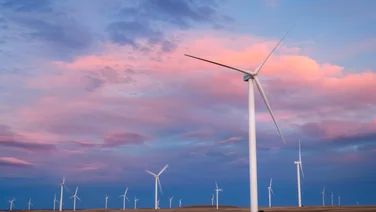- Labour has pushed ahead with plans to launch Great British Energy
- It will be backed up with £8.3bn of taxpayer funds
- The company will be headquartered in Scotland

Sir Keir Starmer made Great British Energy a key pre-election pledge
The government has unveiled a Bill to launch Great British Energy (GBE), a new national energy company designed to invest in renewable sources and technology , as part of its strategy to get the UK to net zero emissions and cut energy bills.
Announced during the King’s Speech on 17 July, GBE will be backed by £8.3bn and will work with the private sector to “develop, own and operate energy projects”.
The government used the speech to say that GBE will “help us take back control of the country’s energy, achieve energy independence, create new jobs, save money for households and tackle climate change”.
The company’s budget will be used to “facilitate, encourage and participate in the production, distribution, storage and supply of clean energy”.
It will also help reduce greenhouse gas emissions produced by fossil fuels, as well as any measures that will speed up the UK’s green transition.
The launch of GBE, which will be headquartered in Scotland, would be the first time the government has been a direct participant in the energy market since the late 1980s, when the electricity industry and British Gas were privatised, as reported by The Guardian.
The GBE Bill was announced as part of the King’s Speech on Wednesday, alongside vape bans and smoking age restrictions, re-nationalising train networks and granting local authorities more powers over transport.
Launching GBE was one of prime minister Sir Keir Starmer’s major pre-election promises.
The King’s Speech: Green highlights
The government has put a big emphasis on sustainability in its first King’s Speech, which should come as no surprise as bills and energy independence dominated the general election, an election that Labour won so resoundingly.
The King’s Speech is only an outline of what the government plans to do by way of new legislation and the Bills will be fleshed or even changed out when they go through the parliamentary process.
“My Government recognises the urgency of the global climate challenge and the new job opportunities that can come from leading the development of the technologies of the future,” the King’s Speech read.
“It is committed to a clean energy transition which will lower energy bills for consumers over time.”
Great British Energy
As already outlined, Great British Energy is the headline green policy, and the government hopes it will cut energy bills and help make the UK energy independent. It is also one part of the strategy to make the UK the green finance capital of the world, for which the government will work closely with private investors.
Transport and infrastructure
Transport will also play a big part of the government’s long term ambition to get the country to net zero. In the King’s Speech, bills for sustainable aviation fuel production and to bring the railways into public hands, as well as to improve the UK’s water by strengthening the powers of water regulators.
What was missing from the King’s Speech?
A notable omission was the petrol and diesel sales ban, a pre-election promise to bring forward a ban on Internal Combustion Engine cars to 2030 from its current date of 2035. This has made Society of Motor Manufacturers and Traders to call for “urgent action” to implement the transition to electric cars.
However, it is expected that Rachel Reeves, Chancellor of the Exchequer, will announce a 2030 ban in her first budget in the Autumn.







